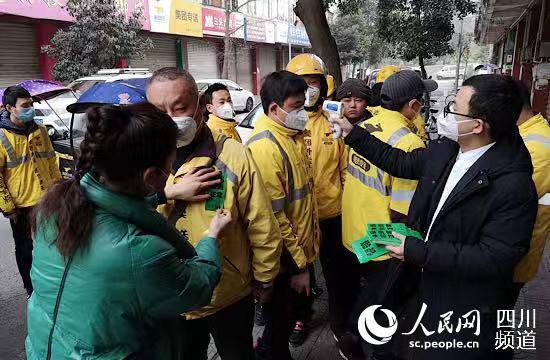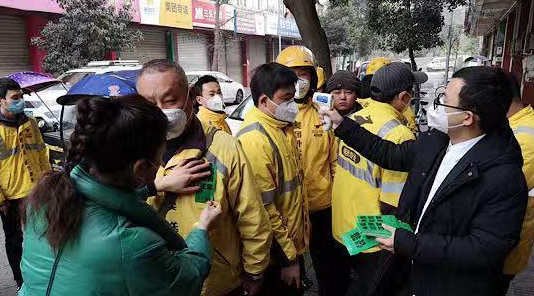In the middle of a severe epidemic, Chinese cities have lost the hustle and bustle of the past, with few cars and pedestrians on the roads. Meanwhile, most people are staying at home to avoid being infected by the novel coronavirus. At the same time, the takeaway deliverymen are busy with work, so as to guarantee the livelihoods of ordinary people.

(Photo/People.cn)
"From New Year's eve to now, I have been working without a day off." In Shanghai, Zhao Hongwu, a vegetable deliveryman from an online food delivery platform, has been very busy these days.
Affected by the epidemic, Shanghai residents generally stay at home nowadays. If they want to buy fresh vegetables, online delivery services have become the top choice they can choose.
"We used to have dozens of orders a day for each deliveryman," Zhao Hongwu said, however, now he has to work from 7 a.m. to 9 p.m. “It is very important for vegetables to be fresh. The sooner they are delivered to the customer, the better."
Zhao Hongwu and his colleagues have witnessed the most direct changes to the city during the epidemic: fewer cars and fewer people on the streets, and what they see most on the streets are the scooters of deliverymen as well as couriers.
Li Xiong, a food deliveryman in Dadukou district of southwest China’s Chongqing, has been working on duty since the outbreak and hasn't taken a break during the Spring Festival. Every day at work, he wears a mask and helmet, disinfects his food box and other tools, and wears a card recording his temperature and other kinds of information.
During this special period, there are only 30 people on duty; however, he used to have about 100 colleagues. For him, as there are fewer orders, his work is easier. On average, there are about 20 orders per day, which is only about 60 percent of his past workload.
He used to work late into the night when he was busy, but now he can leave for home at 6 p.m. "After 6 o 'clock in the afternoon, the malls are basically closed, and we don't have much work to do," Li Xiong explained.
Li Xiong spends about a third of his day delivering drugs for customers. As pharmacy management is now more stringent, online drug orders need to be verified, and customer information has to be registered.
Since most residential communities in Chongqing have carried out closed management, deliverymen would leave the goods to gatekeepers. "There has been a tacit understanding that people have basically chosen not to come into contact with each other to avoid infection with the virus," Li Xiong said.
Still, occasionally some customers would "ask to meet him in person". Li Xiong was puzzled at the request at first. Unexpectedly, at one time, an old man came to give him two face masks as a gift, adding: "Young man, I have some additional masks; you have to protect yourself." Li Xiong still remembered clearly that although it was a cloudy day, he smiled brightly.






